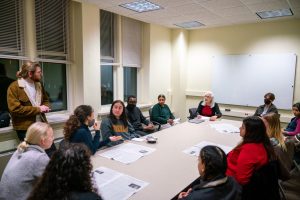New Administration Gives Students Hope
September 1, 2017
Life led me to Oberlin through an old and beat-up language composition book. I remember the very day I was wandering through the dog-eared pages of “The Bird and the Machine,” an essay written by a former Obie professor, Loren Eiseley, when I came across the name of the college for the first time. I was in the 11th grade then, and growing restless from the monotony and institutional red tape sometimes present in high school settings that can hinder students from pursuing social justice in their own hallways.
As one of the few Black girls in my school, I was in serious need of a supportive community that was not tone-deaf to the struggles that people of color face on a daily basis; of an institution that would see my color and my people and give us the room to be, not just funnel us through corridors and pipelines and leave us to the snares of systemic racism that await us all. These needs meant that I had to be very careful and intentional about choosing a college to attend. When the time came to start submitting applications, Oberlin was the first place that I thought of.
Oberlin’s history impressed me. The first college to admit women and Black people? A strong record of pursuing social justice? And only three hours away from home? I was all in. I submitted my application and didn’t look back.
Once I became a student here, it didn’t take long for me to learn that it is us, the students, that make Oberlin the remarkable institution that it is. Without us, all of the slogans on the pamphlets that the college markets to incoming students would be empty words.
Under former College President Marvin Krislov, those slogans did indeed feel empty. From his denial of ABUSUA’s 14-page list of demands to the administration’s poor handling of the racial profiling incident at Gibson’s — which let many students down — it began to feel as though he was nothing more than Oberlin’s fundraising mouthpiece. Upon his exit, a strong divide between the higher levels of the administration and the students became abundantly clear, and the divide was there for good reason.
One could argue that Oberlin has been experiencing an identity crisis since its founding. The College’s seedy history with former student Edmonia Lewis, for example, demonstrates what seems to be a long-standing disconnect between the college’s supposed values and its actions. Are we, as an institution, really about social justice, or are we just saying that we are because it sounds good?
Though every college has its problems, Oberlin happens to hold a very unique and very public position in history. It is a place of radical firsts, a small campus filled with people hailing from all walks of life.
Essentially, Oberlin is a social experiment. It is an organism that is living and breathing and growing. This is a place where we not only push the limits of frontiers, but establish new ones.
Now, we are entering a new era on this campus — a new chapter in this social experiment. Our newly appointed president, Carmen Twillie Ambar, is an extremely accomplished Black woman.
When I first came to Oberlin, I underestimated the power of representation. And yet, when I saw President Ambar speak for the first time this past Saturday at the opening of the annual Social Justice Institute, I was in awe. Being able to see yourself and your ancestors reflected in someone that holds a position of power changes the way you think about your own ability. When she entered the Knowlton Athletics Complex, her presence shifted the room in a way that reminded me of the powerful and grounded intention of other Black and Brown leaders that have gone on to change the world. I see my mother, godmother, grandmother, aunts, older cousins — and so many other remarkable women of color that I have had the honor of knowing in my life—in her.
But most importantly, I see myself and who I aspire to be in her: someone with passion, poise, intent, a willingness to learn and to give, an acute understanding of all that came before, all that is, all that could be, and the courage to act upon that understanding and uphold truth and integrity no matter the cost.
I am not saying all of this just because President Ambar is a Black woman. Sharing a likeness with someone does not mean they will have your best interest in mind. Her Blackness is not a free pass, and I suspect other students of color here will feel the same. In fact, we are likely to have even higher expectations of her. The world is moving and shaking, and we have come into this year hitting the ground running. There is much to be done.
President Ambar seems to be more than up to the challenge, and I have faith that she will be, because this world has seen people like her move mountains, split seas, and do the undoable. Only time will tell, but I am in her corner.

























